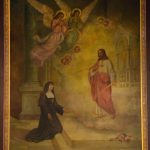
We continue our comment
from the quote,
“they will look to him
whom they have pierced.”
Starting from Zacharie
then, there is a principle all the same
that I would like to tell you.
In the interpretations,
in the comments of the elders,
whether it is the rabbis, whether it is
even the fathers of the Church
and therefore necessarily in the time of John
the Evangelist as well.
When we quote a verse.
we don’t just comment on this verse,
we don’t just
limit ourselves to the strictly
meaning of the verse,
but rather it is a key.
It is assumed, especially at the time,
that we knew
the Scriptures perfectly,
we were much more literate
in the Scriptures
than we are in our time
and therefore a small verse was enough
to open a door
on an immense scriptural landscape,
with twists
and lots of things.
You have already seen, as we had
done with the bone that we do not break, no bone will be broken.
We took quite a detour,
there was Psalm 33,
then there was Exodus 12 with the Passover,
there was the suffering servant with Isaiah and finally
the word of John the Baptist on the Lamb of God.
Likewise, one has to assume that when John quotes
just one verse from Zechariah
he has the whole thing in his head as well,
so immediately
after this 12th chapter of Zechariah
of course begins,
the 13th chapter and at the very beginning.
There is something, which certainly
did not escape John: “In that day
there will be an open fountain.
For the house of David
and for the inhabitants of Jerusalem.
To wash away sins and defilements.”
You can imagine
So there is this open fountain
in Jerusalem.
And John remembers this passage.
Who says in the future
on that day, there will be.
He sees Jesus on the cross.
Crucified in Jerusalem
And from its side flows the water
which symbolizes baptism
and also the outpouring of the Holy Spirit.
So, you can imagine that
he will make the link!
Here is this fountain
which purifies everything, sin,
from all filthiness.
But it does not stop there.
in chapter 14 of Zechariah
then that is a little complicated
because it speaks of the great day of God,
the coming of God in glory.
then one day both formidable
for all who resist God
and a day of blessings,
on the contrary,
for all those who await his coming.
So it is there that Zechariah
writes, within the framework
of a grand vision,
“He will arrive in this on that day
living waters
will come out of Jerusalem,
half to the eastern sea,
half to the western sea.
It will have been winter and summer,
so the Lord will be king
over all the earth.
In that day the Lord will be unique
and his name unique. “
So the coming of glory
is heralded by living waters
flowing out of Jerusalem.
In chapter 13 that I quoted
earlier, it is a fountain
that is still in Jerusalem
and washing away the defilements of Jerusalem.
There, there is a kind of universalization.
It is waters leaving Jerusalem
to go half
to the east, half to the west,
western sea, eastern sea ,
but also to a dimension
which changes in eternity permanently.
There will be, in summer as in winter,
these waters flowing.
So there, there is
a sort of universality,
of universalization and of dimension,
indeed, eternity.
Remember this
because in a few days
we’ll come back.
to comment a very important
passage from St. John,
particularly precisely
relative to white water
rising up from the bosom of Jesus
which John says
he’s’ is the Holy Spirit.
So hold that right
and reread this passage.
it has u chapter 8 of chapter 14
of Zechariah Living Waters.
in verse 8
and verse 9 ch chapters, 14.
And then verse 1 of chapter 13
Source: Fr. Karshttps://www.youtube.com/watch?v=zRBjAVlwB2Y&feature=emb_logo